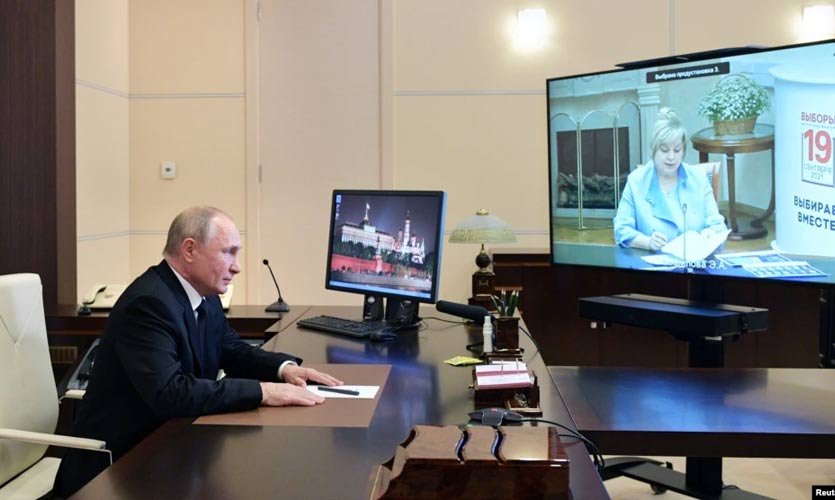President Vladimir Putin who has been running Russia since 1999, alternating his roles as either prime minister or president, has once again demonstrated his strong hand over the political process in the country. His United Russia party emerged as the winner in the parliamentary election held between September 17 to 19 amidst reports of fraud and irregularities.
With the process of counting the ballots almost complete, the United Russia bagged 49.8 percent of the vote while its closest rival, the Communist Party attained 19 percent of the vote, according to the Central Election Commission.
Over the past few days, claims of Putin’s biggest critics being barred from contesting the election along with reports of ballot stuffing and forced voting have been emerging across Russia. Although the election commission of Russia has rejected these claims, the opposition parties including supporters of jailed opposition leader Alexei Navalny, who survived an assassination attempt by Russian security forces last year allege fraud.
In a similar stint, a court in Moscow banned the political organisations linked to the jailed Kremlin critic, Alexei Navalny in June, classifying them as “extremist”. The activists associated with Navalny have feared for their lives ever since. The weekend’s election came amid a brutal crackdown on dissent by the Kremlin. To safeguard their power base and to continue with the current status quo the authorities barred just about all well-known opposition figures from running for elections, while forcing many dissidents into exile and declaring popular independent media outlets to be “foreign agents”.
Independent Russian vote monitor Golos said that it had received multiple reports of electoral frauds. On Sunday night, the organisation said, “There was an obvious decline in the level of publicity, openness and transparency of the electoral system.”
As voting in the parliamentary election began on Friday, Apple and Google deleted Navalny’s tactical voting app from their app stores after Kremlin threatened to arrest their employees. Both companies came under significant pressure from Russian authorities and were accused of interfering in the parliamentary election and their decision to block Navalny’s Smart Voting initiative. Navalny’s initiative tries to channel opposition votes toward the strongest opponents of the ruling party.
Pro-Putin Party Loses Base, Keeps Supermajority In The Duma
Although the United Russia party that endorses Putin has received the majority of votes, the party appears to have seen its share of the vote decline. United Russia had received 54 percent votes during the last election in 2016, signifying a drop of 4.2 percent this year. The Communist Party had attained only 13 percent of the votes last time, signalling a 6 percent increase this time. This comes as more Russians are daring to speak out the bitter truth against Putin’s regime and the living standards in the country amid the brutal attack on opposition leaders and dissenters.
Earlier this year, Putin surprised almost everyone by signing a legislation that proclaims he will stay in power till 2036. “Under the previous constitution, Putin, 68, who has already been in power for more than two decades, would have been required to have stepped down after his second consecutive term ends in 2024,” reported the DW.
On Russia’s changing demography, Timothy Ash, senior emerging markets sovereign strategist at BlueBay Asset Management, said, “The story here should be the low turnout – around 47 percent.” He added, “So despite all the pressure on state workers to vote the turnout was still embarrassing, noting that the result was hardly a vote of confidence in Putin – I would instead argue [it means] a crisis of legitimacy.”
“The real issue which scares the Kremlin is the changing demographics. It means more people born as the Soviet Union ended and since then are becoming a much bigger share of the voter base. This is the generation that travels and uses the internet to a greater extent, on a per capita basis, than people in most other countries. [They] want improved lifestyle, incomes, social supports and a better future for themselves and their families. The big challenge for President Putin and the so-called Russian ‘elites’ will be how to satisfy those expectations while keeping power. Failure in the former will more severely undermine to latter in the next presidential term – no matter who that president may be,” said Chris Weafer, CEO of Moscow-based strategy consultancy Macro-Advisory, as quoted by CNBC.
Read more: Vietnam And China At Odds Over The South China Sea
International Community Slams Kremlin For Its Attack On Democracy
Multiple countries including the US, the UK and the European Union slammed the Russian authorities for their brutal behaviour against the dissenters and opposition candidates during the elections.
US State Department spokesperson Ned Price said that the election “took place under conditions not conducive to free and fair proceedings”. “We do not recognize holding elections for the Russian Duma on sovereign Ukrainian territory and reaffirm our unwavering support for the territorial integrity and sovereignty of Ukraine,” added Price, as quoted by the DW.
The UK foreign office said, “Measures taken by the Russian authorities to marginalise civil society, silence independent media and exclude genuine opposition candidates from participating in the elections undermine political plurality and are at odds with the international commitments that Russia has signed up to.”
The European Union expressed its concern over the political intimidation ahead of the elections. “What we have seen in the run-up to these elections was an atmosphere of intimidation of all the critical independent voices,” said EU foreign affairs spokesman, Peter Stano.










